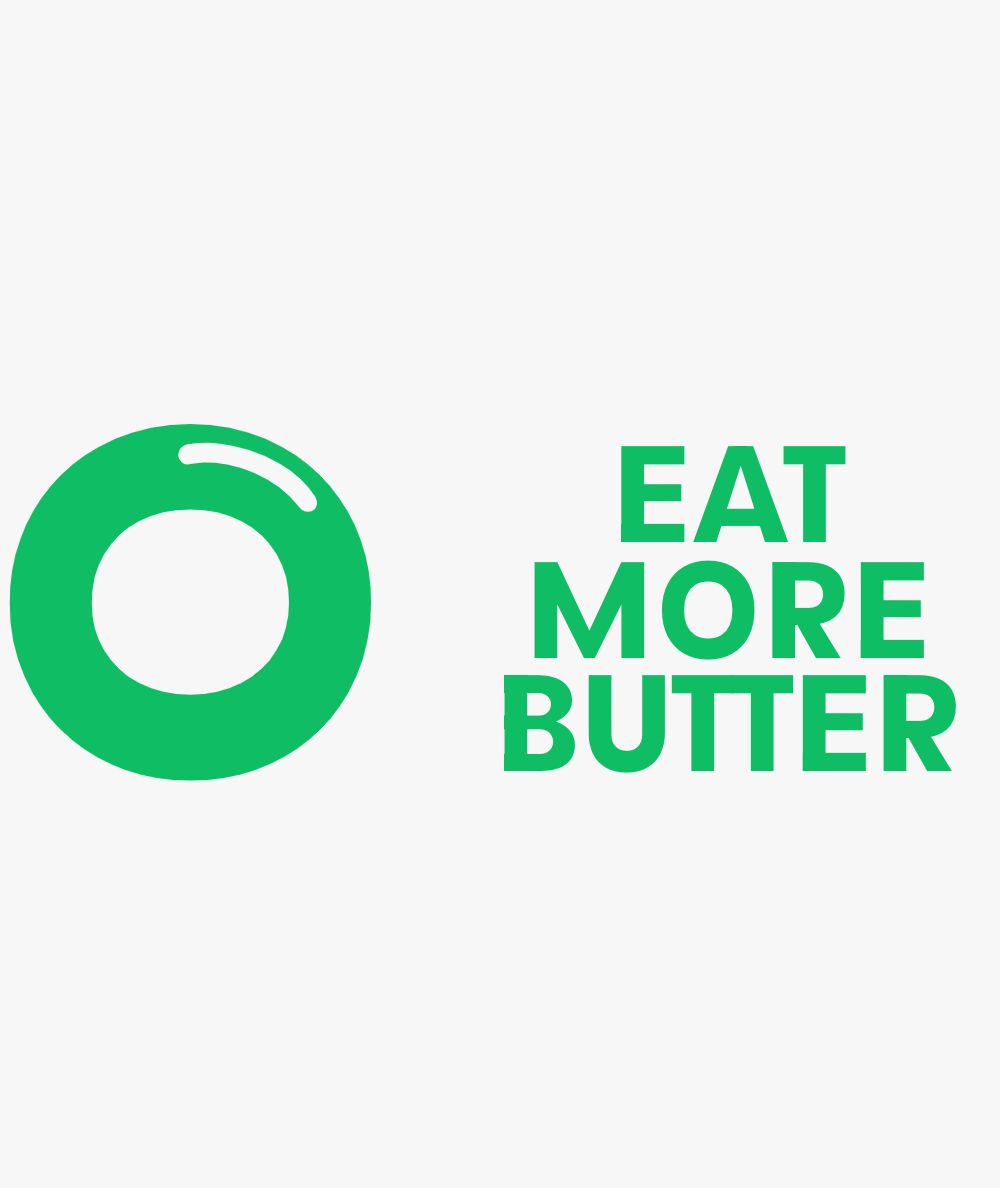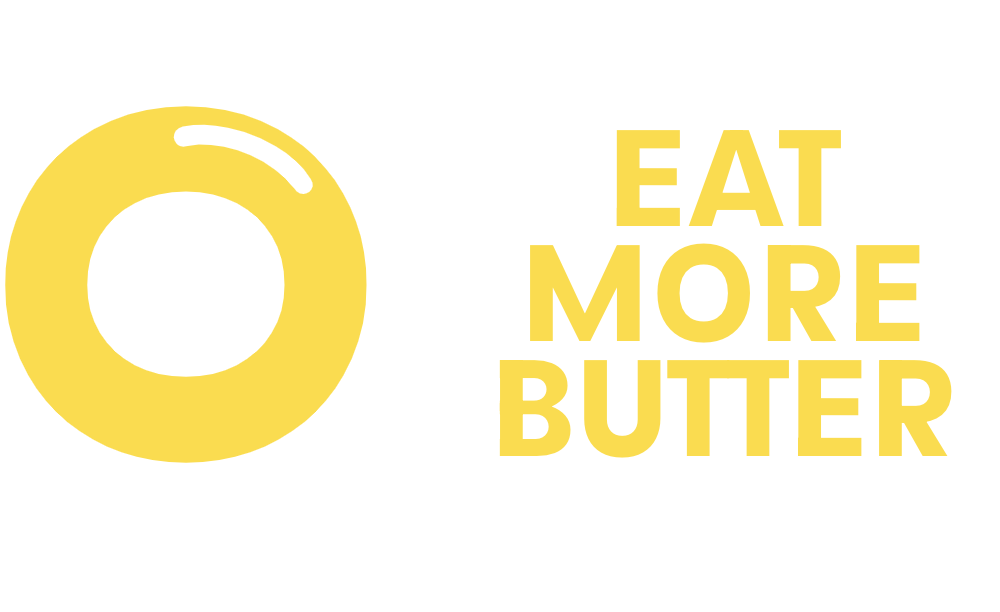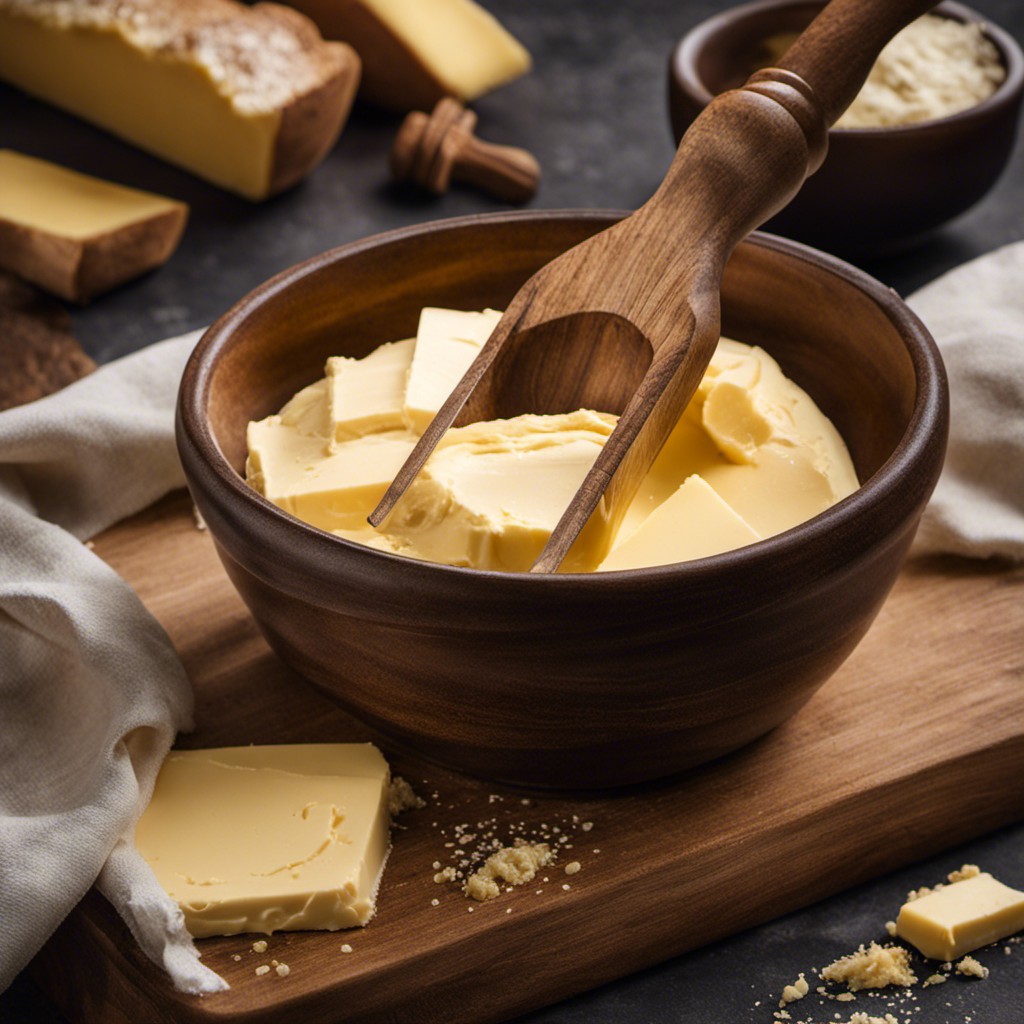Butter Tips and Tricks
How Much Butter You Should Eat in a Day: A Simple Guide

I’ve always experienced mixed feelings towards butter. It brings a lush and velvety taste to the dishes I adore. However, I’ve also been bombarded with numerous cautions regarding its effects on health.
So, how much butter should I really be eating each day? In this article, we’ll dive into the science behind butter consumption and explore the recommended daily intake.
Get ready to butter up your knowledge and make informed choices about this delicious spread.
Key Takeaways
- Butter contains essential vitamins A, D, E, and K.
- Butter consumption in moderation can provide several health benefits.
- Moderation and overall daily calorie goals are key for healthy butter consumption.
- There are various alternatives available for reducing butter consumption.
Health Benefits of Butter Consumption
Eating butter in moderation can provide several health benefits. Contrary to popular belief, butter contains healthy fats that are essential for our bodies. One of the main benefits of butter consumption is that it provides a good source of vitamins A, D, E, and K. These fat-soluble vitamins play a crucial role in maintaining our overall health.
Additionally, butter is rich in conjugated linoleic acid (CLA), a fatty acid that has been associated with numerous health benefits, including reducing inflammation and promoting weight loss. Moreover, the saturated fats in butter help in the absorption of other important nutrients, such as calcium and minerals.
However, it is important to note that moderation is key. Too much butter can lead to weight gain and increased risk of heart disease. Therefore, it is recommended to enjoy butter as part of a balanced diet.
Recommended Daily Intake of Butter
When it comes to healthy butter consumption, it’s important to find the right balance. While butter is a source of saturated fats which can increase cholesterol levels, it can still be enjoyed in moderation as part of a balanced diet.
However, if you’re looking for alternatives, there are plenty of options available that can provide similar taste and texture without the potential negative impact on cholesterol.
Healthy Butter Consumption
Using butter in moderation can be a part of a healthy diet. It can still have a place in a balanced eating plan as long as it fits within your overall daily calorie goal. Studies have shown that moderate consumption of saturated fats, such as those found in butter, may not be as harmful as once thought in terms of heart health. However, it is still recommended to choose healthier fats, like olive oil or avocado, as the primary sources of dietary fat.
Transitioning into the next section, let’s now explore the relationship between butter and cholesterol levels.
Butter and Cholesterol
Contrary to popular belief, moderate consumption of butter may not significantly raise cholesterol levels. While butter does contain saturated fat, which has long been associated with increased cholesterol levels and a higher risk of heart disease, recent research suggests that the relationship between butter and cholesterol is more complex than previously thought.
Here are some important points to consider:
-
Butter and Heart Disease: While saturated fat intake is a risk factor for heart disease, studies have shown that the link between butter consumption and heart disease is not as strong as once believed. Other factors, such as overall dietary patterns and lifestyle choices, play a more significant role in heart health.
-
Butter and Weight Gain: Butter is calorie-dense and can contribute to weight gain if consumed in excess. However, when incorporated into a balanced diet and consumed in moderation, butter can be a part of a healthy eating plan without causing weight gain.
Butter Alternatives
A variety of alternatives are available for those looking to reduce their consumption of butter. Butter substitutes and dairy-free spreads can be great options for individuals who are lactose intolerant, have a dairy allergy, or are following a vegan lifestyle.
These alternatives are made from various plant-based ingredients such as nuts, seeds, and oils. Some popular choices include almond butter, coconut oil, avocado spread, and olive oil. These options provide a similar creamy texture and can be used in cooking, baking, and spreading on toast or bread.
When choosing a butter substitute, it’s important to consider the taste, nutritional content, and ingredients. Reading labels and opting for options with minimal additives is recommended.
Experimenting with different alternatives can be a fun and delicious way to reduce your butter consumption while still enjoying your favorite foods.
Potential Risks of Consuming Too Much Butter
Eating too much butter can lead to increased risks of heart disease and high cholesterol. While butter can be enjoyed in moderation as part of a balanced diet, excessive consumption may have negative consequences on our health. Here are some potential risks associated with excessive butter consumption:
- Increased levels of LDL or ‘bad’ cholesterol
- Higher risk of developing heart disease
- Elevated blood pressure due to the high sodium content in butter
- Increased likelihood of weight gain and obesity
It is important to be mindful of our butter intake and make healthier choices when possible. Transitioning to healthier alternatives, such as margarine, can be a good option.
In the next section, we will explore the debate between butter and margarine to determine which is the healthier choice.
Butter Versus Margarine: Which Is Healthier
When it comes to choosing between butter and margarine, it’s important to consider their nutrition and health impacts.
Both butter and margarine have different nutritional profiles and can have different effects on our health.
In this discussion, we will explore the differences between butter and margarine in terms of their nutritional content and the potential health impacts they may have.
Butter Vs Margarine: Nutrition
Butter and margarine have different nutritional profiles, so it’s important to consider their impact on our health and weight loss goals when choosing between the two.
Here’s a breakdown of the nutritional differences:
-
Butter is a dairy product made from churning cream, while margarine is a processed spread made from vegetable oils.
-
Butter contains saturated fats, which can raise cholesterol levels. On the other hand, margarine is often made with hydrogenated oils that contain trans fats, which are also unhealthy.
-
Butter is a good source of vitamins A, D, and E. In contrast, margarine is often fortified with vitamins to make up for the lack of nutrients in vegetable oils.
-
Ghee, a clarified form of butter, has a higher smoke point and is suitable for high-temperature cooking.
When it comes to weight loss, moderation is key. Both butter and margarine can be part of a balanced diet, but it’s important to choose healthier options and consume them in moderation.
Health Impacts: Butter Vs Margarine
When it comes to the health impacts of butter and margarine, it’s important to consider the risks associated with saturated fats. Butter is high in saturated fats, which can increase cholesterol levels and contribute to heart disease. On the other hand, many margarines are made with hydrogenated oils, which contain trans fats that are also harmful to heart health. To help understand the differences between the two, here is a table comparing the health risks of saturated fats in butter and some common butter substitutes:
| Butter | Coconut oil | Olive oil |
|---|---|---|
| High in saturated fats | High in saturated fats | Low in saturated fats |
| Contributes to heart disease | May increase cholesterol levels | Heart-healthy option |
As you can see, butter and coconut oil have similar health risks due to their high saturated fat content, while olive oil is a healthier choice with lower amounts of saturated fat.
Incorporating Butter Into a Balanced Diet
To incorporate butter into a balanced diet, you should consider portion sizes and opt for healthier cooking methods. While butter is not suitable for a vegan diet, it can still be enjoyed in moderation by those who follow a vegetarian or flexitarian diet. Here are some practical tips for incorporating butter into a balanced diet:
-
Use smaller portions: Instead of slathering butter on bread or vegetables, use a measured amount to control your intake.
-
Choose grass-fed butter: Grass-fed butter contains higher levels of omega-3 fatty acids and vitamin K2, which can have potential health benefits.
-
Try healthier cooking methods: Instead of frying foods in butter, consider using it sparingly for flavoring or switch to healthier alternatives like olive oil or avocado oil.
-
Consider your overall calorie intake: If you are trying to lose weight, be mindful of your overall calorie intake and ensure that you are not exceeding your daily calorie goals.
Expert Opinions on Butter Consumption
According to experts, incorporating butter into a balanced diet can be done by considering portion sizes and healthier cooking methods.
Butter consumption trends have changed over the years, with some people reducing their intake due to concerns about saturated fats. However, it is important to note that butter has been a staple in traditional diets for centuries.
In moderation, butter can provide essential nutrients like vitamins A, D, E, and K. When it comes to portion sizes, it is recommended to use butter sparingly and opt for healthier alternatives like olive oil or avocado.
Additionally, healthier cooking methods such as sautéing or using a small amount to add flavor can help reduce overall butter consumption.
Ultimately, it is about finding a balance and listening to your body’s needs when it comes to incorporating butter into your diet.
Frequently Asked Questions
How Does Butter Consumption Affect Cholesterol Levels?
Butter consumption can affect cholesterol levels. Research suggests that excessive butter intake may increase LDL cholesterol, which is associated with an increased risk of heart disease. Moderation is key to maintaining a healthy diet.
Can Eating Too Much Butter Contribute to Weight Gain?
Eating too much butter can contribute to weight gain. When consumed in excess, butter can negatively impact metabolism and insulin sensitivity, making it harder for the body to burn calories efficiently.
Is It Safe to Consume Butter if I Have a Dairy Allergy or Lactose Intolerance?
If you have a dairy allergy or lactose intolerance, it may not be safe to consume butter. Dairy alternatives and butter substitutes can be a safer option for you.
Does Butter Consumption Increase the Risk of Heart Disease?
Butter consumption in moderation can be part of a heart-healthy diet. The recommended daily intake of fats, including butter, is about 20-35% of total calories. It is important to balance butter consumption with other nutritious foods.
What Are Some Alternative Options for Incorporating Butter Into a Balanced Diet for Individuals With Dietary Restrictions?
Alternative butter substitutes and butter-free recipes can be a great way to accommodate dietary restrictions. I’ve found that using avocado as a spread, or making mashed cauliflower instead of mashed potatoes, can be delicious and healthy options.
Conclusion
In conclusion, when it comes to butter consumption, moderation is key.
While butter does provide some health benefits, such as being a good source of vitamins and healthy fats, it is important to keep in mind the recommended daily intake.
Consuming too much butter can lead to potential risks, such as an increased risk of heart disease.
It is also worth considering the comparison between butter and margarine, as the latter may be a healthier alternative.
Ultimately, incorporating butter into a balanced diet, in reasonable amounts, can be a practical approach to enjoying its flavor and benefits without going overboard.
As the saying goes, ‘everything in moderation.’
Diana’s meticulous nature and editorial prowess set the gold standard for our content. With over a decade in the culinary and publishing industries, her guidance ensures that every article perfectly blends information and entertainment. A culinary experimenter, Diana loves whipping up new butter-based concoctions in her kitchen.
Butter Tips and Tricks
Butter Hacks: 2/3 Cup Butter Is How Many Tablespoons?
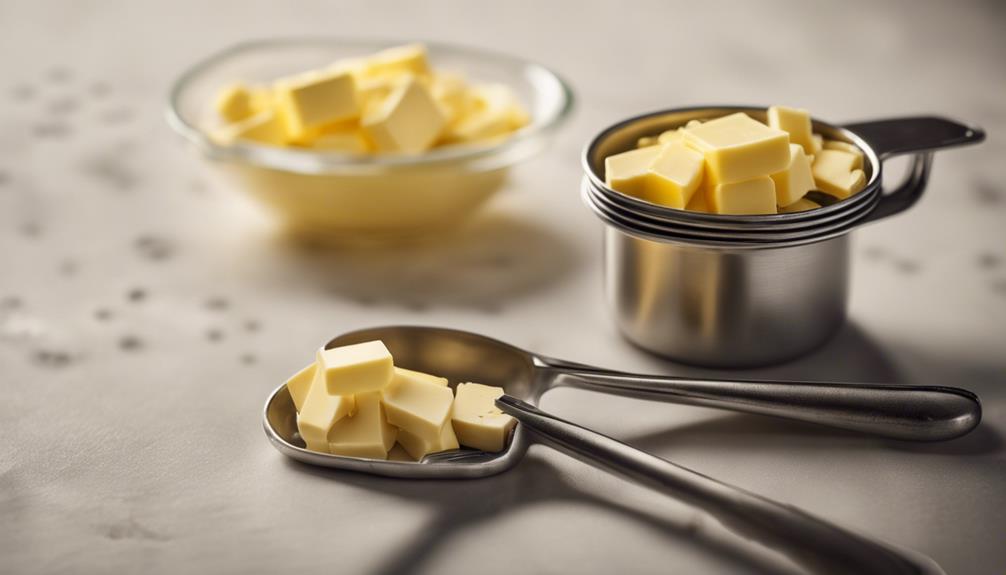
If you’ve ever wondered, 2/3 cup of butter equals around 10.67 tablespoons. This handy conversion guarantees your recipes turn out just right.
Key Takeaways
- 2/3 cup of butter equals 10.67 tablespoons.
- Useful for recipes specifying butter in tablespoons.
- Ensures precise measurements in cooking.
- Simplifies adjusting butter quantities.
- Essential for accurate recipe results.
The Full Conversion Chart
Exploring the entire conversion chart for butter measurements can simplify your cooking endeavors. Understanding the different measurements for butter, such as blocks, sticks, cups, tablespoons, and weight in grams, allows you to easily adapt recipes to suit your needs.
For example, knowing that a block of butter weighs 5.33 ounces and that this is equivalent to 2.67 ounces in stick form can be incredibly helpful when following a recipe that specifies one form over the other.
Furthermore, realizing that 1/6 pound of butter is equal to one cup, or that one tablespoon of butter is approximately 80 milliliters, enables you to make precise adjustments based on what measuring tools you have available.
This detailed chart provides you with the flexibility to confidently experiment in the kitchen, ensuring that your dishes turn out just right every time. Whether you’re baking, sautéing, or simply spreading butter on your toast, having a solid grasp on these conversions will surely enhance your culinary skills.
How Much Is 1 Stick?
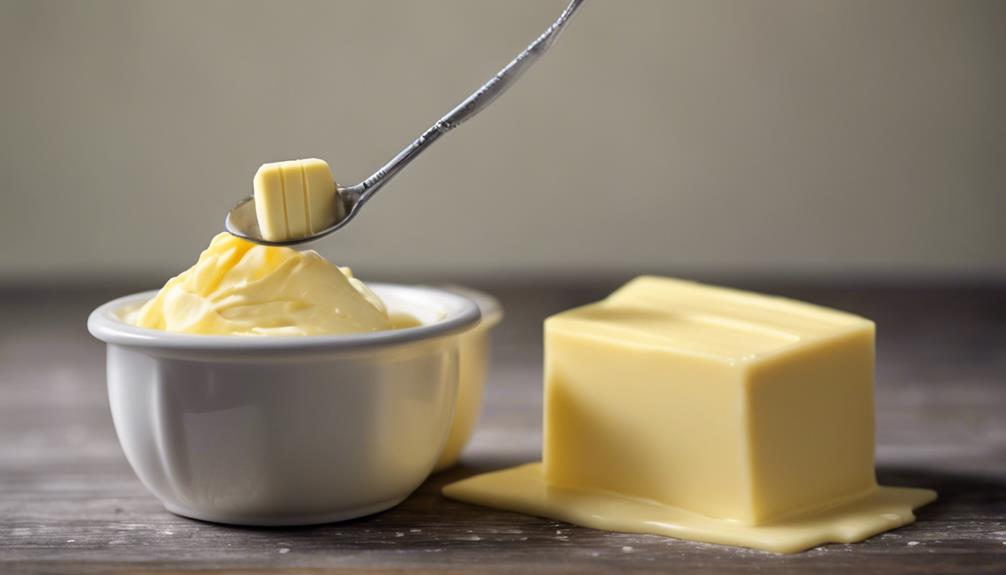
To accurately measure butter, understanding the quantity in 1 stick is important for following recipes effectively. One stick of butter equals 8 tablespoons, approximately 4 ounces or 113 grams in weight, and fills half a cup. When working with recipes that call for butter, this information is vital for precise measurements.
Butter sticks are conveniently marked with tablespoon measurements, simplifying the process of cutting the right amount. By knowing how much butter is in 1 stick, you can easily adapt recipes to suit your needs without any guesswork.
Whether you’re baking a batch of cookies or whipping up a savory sauce, having this knowledge at your fingertips guarantees your dishes turn out just right every time. So next time you reach for a stick of butter, remember these measurements to ensure cooking or baking success.
Measuring Butter From Sticks

When measuring butter from sticks, make certain you understand that each stick is equivalent to 8 tablespoons or 1/2 cup. This means that if a recipe calls for 2/3 cup of butter, you’d need 1 stick plus 2 and 2/3 tablespoons of butter. Understanding this conversion is essential for accurately measuring butter in various recipes.
Measuring butter from sticks is a convenient way to portion out the right amount for your cooking or baking needs. By knowing that one stick equals 8 tablespoons, you can easily adjust the quantity of butter required for a recipe.
Whether you’re using butter in cups, tablespoons, or sticks, being able to convert between these measurements guarantees that your dishes turn out just right.
Next time you reach for a stick of butter, remember that it contains 8 tablespoons or 1/2 cup. This knowledge will simplify your cooking process and help you achieve consistent results in the kitchen.
Butter in Tablespoons (Tbsp.)

When measuring butter in tablespoons (Tbsp.), it’s essential to know that 2/3 cup of butter is equivalent to 10 and 2/3 tablespoons. Understanding this butter conversion can simplify your cooking and baking experience.
Here are a few key points to keep in mind:
- Converting cups to tablespoons: To convert 2/3 cup of butter to tablespoons, multiply 2/3 by 16 (since 1 cup equals 16 tablespoons).
- Precise measurement: The calculation results in 10.67 tablespoons, which can be rounded to 10 and 2/3 tablespoons. This accuracy is vital for achieving consistent results in your recipes.
- Convenience in recipes: Knowing the butter measurements in tablespoons can be handy when a recipe specifies butter in this unit rather than cups, making it easier to follow instructions accurately.
Mastering butter measurements in tablespoons allows you to confidently navigate various recipes and secures your dishes turn out just right.
Butter Vs. Margarine Conversion

For a straightforward butter versus margarine conversion comparison, consider the differences in teaspoons and tablespoons.
Butter Margarine 1 Teaspoon 1 Teaspoon 1 Tablespoon 1 Tablespoon 1/4 Cup 1/4 Cup
When substituting butter for margarine in recipes, bear in mind the conversion rate between the two. While both butter and margarine serve as fats in baking and cooking, they have slightly different compositions due to their ingredients. If a recipe calls for margarine but you prefer to use butter, a simple swap can be made using the table above. Remember that the water content in butter is higher than in margarine, which can affect the final texture of your dish. Experimenting with different ratios based on the conversion table can help you achieve the desired result.
Olive Oil Conversion
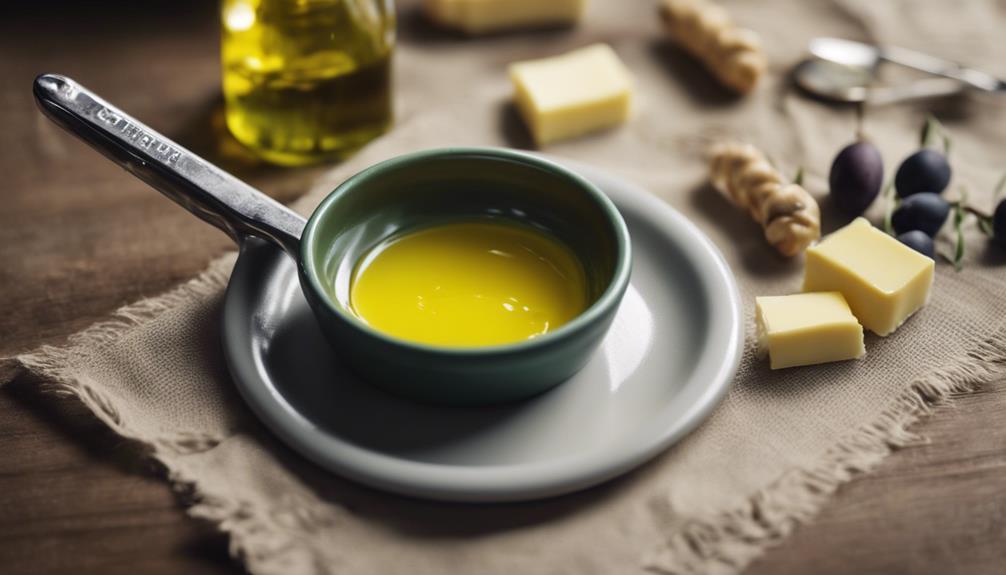
To convert olive oil measurements effectively in your recipes, remember the following equivalences:
- 1/4 Cup of olive oil is equivalent to 1/4 Cup of butter/margarine.
- 1/4 Cup + 2 Tablespoons of olive oil is equal to 1/2 Cup of butter/margarine.
- 1/2 Cup of olive oil is the same as 1/2 Cup + 1 Tablespoon of butter/margarine.
When substituting olive oil for butter or margarine in your recipes, keep these conversions in mind to guarantee your dish turns out just right. Whether you’re aiming for a healthier option or simply prefer the taste of olive oil, knowing how to make these conversions can make a significant difference in your cooking.
Next time you reach for olive oil instead of butter, confidently adjust your measurements using these simple equivalences.
Healthy Alternative: Olive Oil
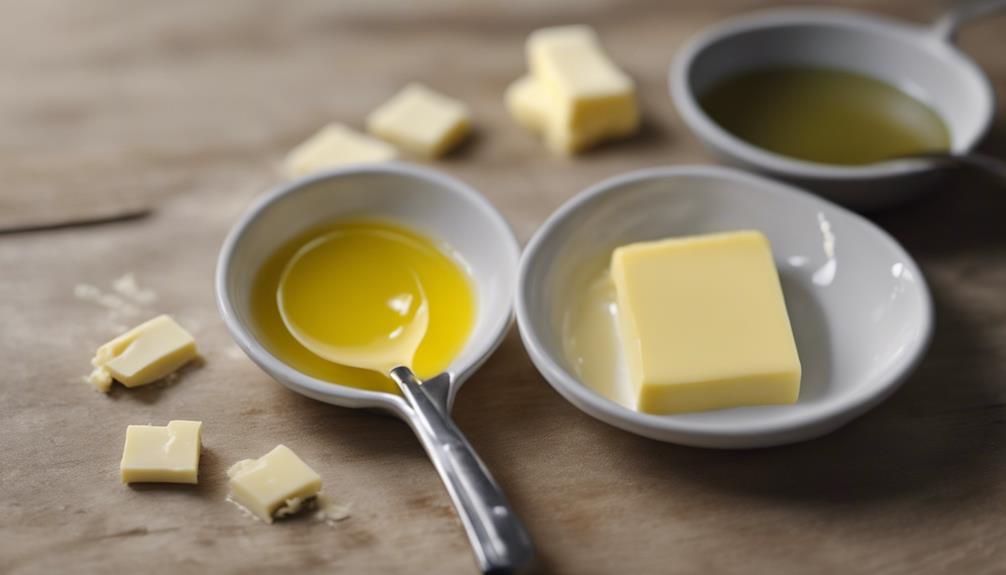
Looking to make healthier choices in your cooking? Olive oil can be a great alternative to butter, providing a higher content of monounsaturated fats.
Benefits of Olive Oil
Consider incorporating olive oil into your cooking routine as a healthier alternative to butter, thanks to its rich content of monounsaturated fats. Substituting butter with olive oil not only reduces saturated fat intake but also maintains a similar texture and flavor profile in your dishes.
Here are some benefits of using olive oil:
- Healthier Fat Option: Olive oil is packed with monounsaturated fats, which are considered heart-healthy fats that can help lower bad cholesterol levels.
- Versatility in Cooking: From baking to sautéing and creating flavorful dressings, olive oil proves to be a versatile ingredient suitable for various cooking methods.
- Unique Flavor Profile: Unlike butter, olive oil adds a distinct taste to your dishes, enhancing the overall flavor experience while offering a healthier alternative.
Incorporating olive oil into your daily cooking not only brings health benefits but also contributes to a more balanced and flavorful diet.
Cooking With Olive Oil
Enhance your cooking routine by incorporating olive oil as a healthier alternative to butter in various dishes. Olive oil offers a distinct flavor profile that can elevate the taste of your meals while providing several health benefits. Rich in monounsaturated fats, olive oil is considered heart-healthy and can help lower bad cholesterol levels.
When cooking with olive oil, you have the flexibility to use it in different methods such as sautéing, roasting, and making salad dressings. This versatility makes it a great choice for a wide range of recipes. By substituting butter with olive oil, you can reduce your saturated fat intake without compromising on flavor.
Next time you’re in the kitchen, consider reaching for olive oil instead of butter. Not only will you be making a healthier choice, but you’ll also be adding a delicious twist to your favorite dishes. Experiment with olive oil in your cooking and discover the wonderful benefits it can bring to your meals.
Contact & Copyright Information
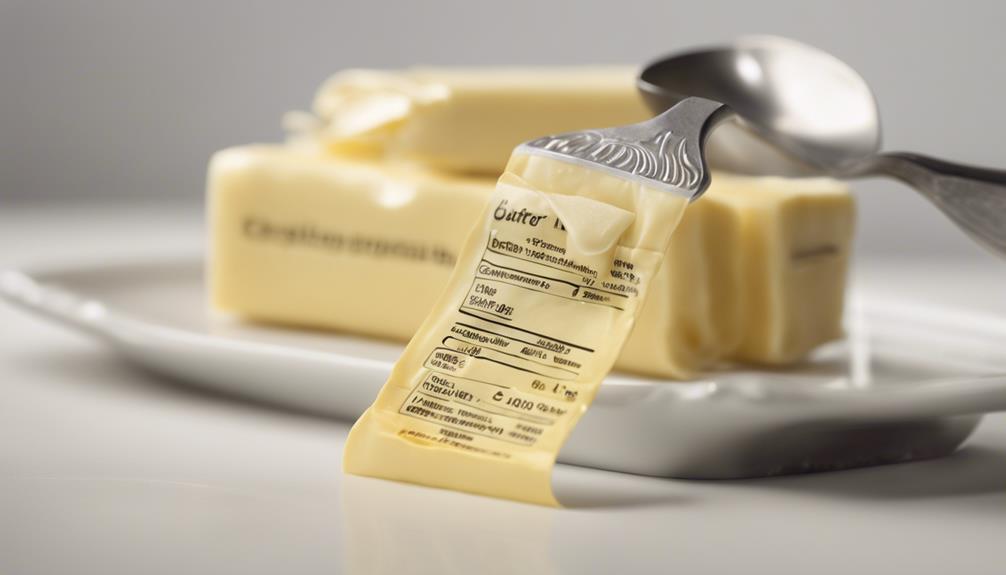
For more details on butter and olive oil conversions, contact Monadnock Oil and Vinegar, LLC at their Dublin branch by dialing 603-563-7066 or at their Amherst branch at 603-589-9954.
If you prefer email correspondence, you can reach them at [emailprotected].
Remember that all content related to butter and olive oil conversions is protected by copyright owned by Monadnock Oil and Vinegar, LLC. Reproduction rights are reserved from 2015 to 2024, and any unauthorized use is strictly prohibited.
If you intend to use or refer to their content, make sure you have the appropriate permissions to avoid any copyright violations.
Frequently Asked Questions
How Many Tablespoons Is 2/3 Cup in a Stick of Butter?
To know how many tablespoons are in 2/3 cup of butter in a stick, remember it’s around 10 2/3 tablespoons or about 1 stick plus 2 tablespoons. This helps you accurately measure butter for recipes.
Is 1 Stick of Butter the Same as 1 2 Cup?
Yes, 1 stick of butter is equal to 1/2 cup. That means a stick of butter contains 8 tablespoons. Understanding these measurements can make your cooking and baking experiences smoother and more precise.
How Many Tablespoons Is a Full Cup of Butter?
To measure a full cup of butter, you’d need 16 tablespoons. That’s the scoop for your baking adventures. Remember this handy conversion to make your kitchen creations a piece of cake!
How Much Is 1 Cup of Butter in Stick Butter?
To convert 1 cup of butter to sticks, you need 2 sticks. For tablespoons, that’s 16 tablespoons. Knowing these conversions helps in precise measuring for recipes. It’s essential for successful baking and cooking.
Conclusion
Remember, when it comes to butter hacks, knowing how to convert measurements can make all the difference in your cooking.
As the saying goes, ‘A little butter can make everything better.’
So next time you’re in the kitchen and wondering how many tablespoons are in 2/3 cup of butter, you’ll be prepared to whip up something delicious with ease.
Happy cooking!
Diana’s meticulous nature and editorial prowess set the gold standard for our content. With over a decade in the culinary and publishing industries, her guidance ensures that every article perfectly blends information and entertainment. A culinary experimenter, Diana loves whipping up new butter-based concoctions in her kitchen.
Butter Tips and Tricks
How Many Sticks of Butter in 1 Cup: A Step-by-Step Guide
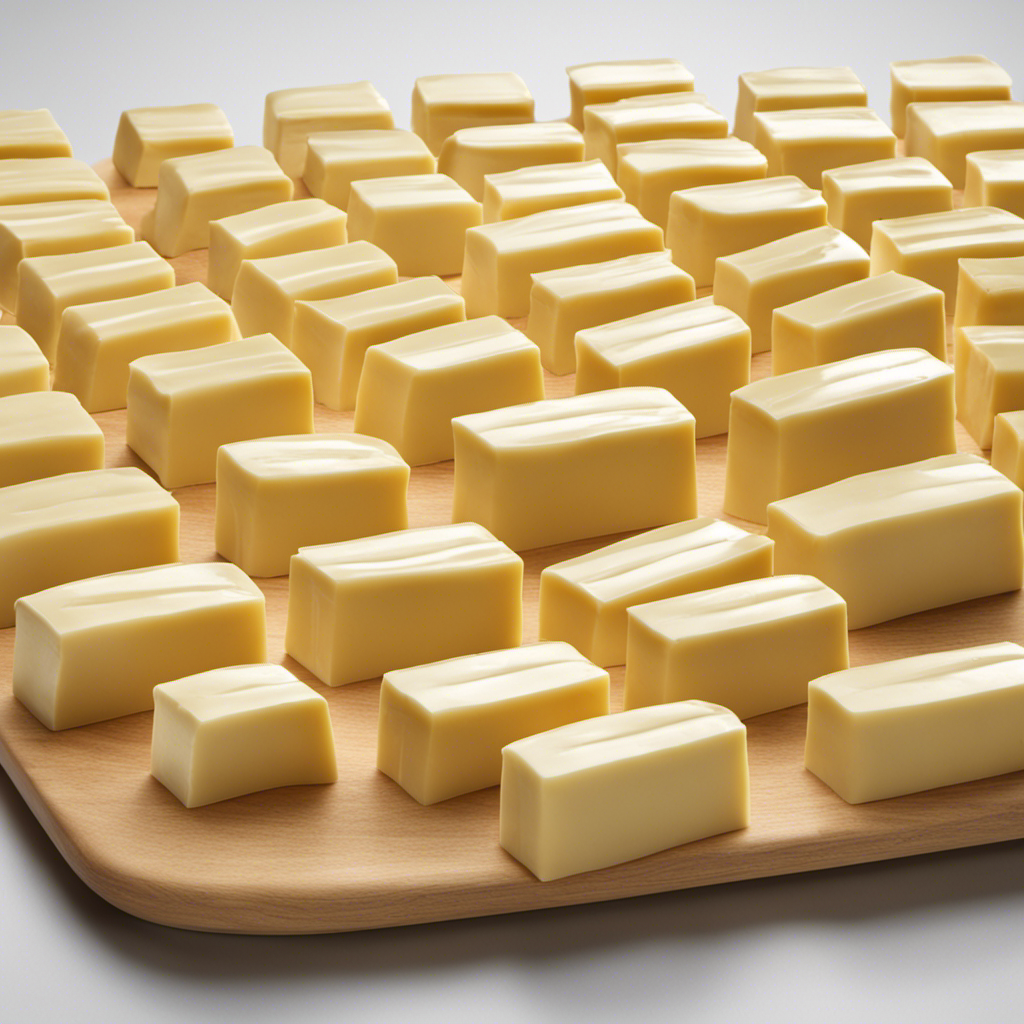
Ever wondered how many sticks of butter are in one cup? Well, I have the answer for you!
Picture this: you’re in the middle of baking your favorite recipe and suddenly realize you’re out of butter. Panic sets in as you scramble to figure out the conversion from cups to sticks. But fear not!
In this article, I’ll break it down for you, providing all the information you need to know about the butter-to-cup ratio and how to make your baking adventures a breeze.
Key Takeaways
- 1 cup of butter is equal to 2 sticks or 16 tablespoons.
- Converting butter measurements from cups to sticks or vice versa is crucial for accurate recipe adjustments.
- Different brands may have varying measurements for butter, so it’s important to be aware of equivalents.
- Using the measurement markings on the butter wrapper allows for precise cutting of fractional amounts.
Understanding the Butter-to-Cup Ratio
1 cup of butter is equal to 2 sticks. When it comes to converting butter measurements, it’s important to understand the ratios.
If a recipe calls for tablespoons of butter, 1 stick is equivalent to 8 tablespoons. So, if you need 1 cup of butter, you’ll need 16 tablespoons or 2 sticks.
It’s also important to note the difference between salted and unsalted butter. Salted butter contains added salt, while unsalted butter does not. This can affect the taste and overall flavor of your dish.
When a recipe calls for unsalted butter, it’s best to stick to that recommendation to have better control over the amount of salt in the recipe. However, if you only have salted butter on hand, you can reduce the amount of added salt in the recipe.
Converting Butter Measurements: Cups to Sticks
When it comes to baking, understanding the butter cup to stick ratio is crucial. Knowing how many sticks of butter make up one cup can make or break a recipe.
In addition to the ratio, having an accurate conversion method from cups to sticks is essential for precise measurements.
Lastly, it’s important to familiarize oneself with common butter measurements to ensure successful baking endeavors.
Butter Cup to Stick Ratio
To determine the ratio of sticks of butter to cups, we can use this conversion chart. Understanding butter measurements is essential for baking and cooking. Converting butter ratios is a common task in the kitchen.
The standard stick of butter in the United States weighs 1/2 cup or 8 tablespoons. Therefore, if a recipe calls for 1 cup of butter, you will need 2 sticks. If the recipe calls for 1/2 cup of butter, you will need 1 stick.
It’s important to note that butter measurements can vary by country, so always consult a reliable conversion chart if you’re working with international recipes. By knowing the butter cup to stick ratio, you can confidently adapt recipes to suit your needs.
Accurate Conversion Method
The most accurate way to convert measurements is by consulting a reliable conversion chart. When it comes to measuring butter, it can be tricky since it often comes in sticks or cups. Here are some tips to help you accurately measure butter:
- Use a conversion chart: This will give you the exact measurement equivalents for butter, whether it’s in sticks or cups.
- Soften the butter: If a recipe calls for melted butter, measure it in its solid form and then melt it. This ensures accurate measurements.
- Use a kitchen scale: Weighing the butter can give you precise measurements, especially when dealing with small amounts.
- Know the standard measurements: One stick of butter is equal to 1/2 cup or 8 tablespoons. A cup of butter, on the other hand, is equal to 2 sticks or 16 tablespoons.
Common Butter Measurements?
Knowing the equivalents for different measurements of butter, such as tablespoons and sticks, can be helpful when following recipes. It ensures that you are adding the right amount of butter, which can greatly impact the outcome of your dish. Here are some common butter measurement equivalents to keep in mind:
| Measurement | Equivalent |
|---|---|
| 1 stick | 1/2 cup (8 tablespoons) |
| 1/2 stick | 1/4 cup (4 tablespoons) |
| 1/4 stick | 1/8 cup (2 tablespoons) |
| 1 tablespoon | 1/16 cup (1/2 stick) |
When measuring butter, it’s important to be accurate. Use a kitchen scale for precise measurements, especially if the recipe calls for weight measurements. If you don’t have a scale, use a butter dish with marked measurements. Softened butter should be leveled off with a knife. When using tablespoons, make sure to fill them completely and level off the excess with a straight edge. These tips will help you measure butter accurately and achieve the best results in your recipes.
The Standard Size of a Stick of Butter
A stick of butter is typically equal to 1/2 cup. Understanding butter packaging and different butter measurements in other countries can be confusing.
Here are some key points to help you navigate the world of butter measurements:
- In the United States, butter is commonly sold in sticks, with each stick weighing 1/4 pound or 1/2 cup. This makes it easy to measure and use in recipes.
- In some European countries, butter is sold in blocks or tubs, with measurements listed in grams or kilograms. It’s important to convert these measurements to cups or ounces for American recipes.
- In Australia, butter is usually sold in 250g or 500g blocks, which can be converted to cups or ounces using conversion charts.
- When traveling or using international recipes, it’s helpful to familiarize yourself with the local butter measurements to ensure accurate results.
How Much Butter Is in 1 Cup
When it comes to baking, understanding the butter to cup ratio is crucial. Knowing how much butter is in 1 cup can help ensure that your recipes turn out perfectly.
Additionally, learning how to convert butter measurements can be helpful when using recipes from different countries or regions.
Lastly, if you’re looking for butter substitutes in baking, there are several options available that can still provide the moisture and richness that butter brings to baked goods.
Butter to Cup Ratio
To measure the butter to cup ratio, you can easily convert sticks of butter to cups. Understanding butter density is key to accurately converting butter measurements from tablespoons to cups. Here’s a step-by-step guide:
- Start by knowing that one stick of butter is equal to 1/2 cup. This is a common measurement used in many recipes.
- If your recipe calls for a different amount of butter in cups, you can use this conversion: 1 cup of butter is equivalent to 2 sticks or 16 tablespoons.
- To convert tablespoons to cups, divide the number of tablespoons by 16. For example, if you have 8 tablespoons of butter, it would be equal to 1/2 cup.
- Remember, when measuring butter, it’s important to consider its density. Softened or melted butter may take up less space compared to cold or solid butter.
Converting Butter Measurements
Understanding the conversion of butter measurements can help me confidently adjust my recipe. When it comes to baking or cooking, accuracy is key. Knowing the equivalents of butter can save me time and ensure the perfect outcome.
One cup of butter is equal to two sticks or 16 tablespoons. This information is crucial when a recipe calls for a specific amount of butter in cups, but I only have sticks. Conversely, if a recipe specifies butter in sticks, I can easily convert it to cups by dividing the number of sticks by two.
To measure butter accurately, I can use a kitchen scale or the markings on the butter wrapper. Softened butter should be packed into measuring cups, while solid butter should be cut according to the desired quantity.
With these tips, I can confidently use the correct amount of butter in my recipes.
Butter Substitutes in Baking
If you’re looking to substitute butter in your baking, there are various options available that can still yield delicious results. Here are four butter alternatives that not only provide a healthier option but also offer unique flavors and health benefits:
- Coconut oil: This versatile alternative adds a subtle tropical taste to your baked goods and is rich in healthy fats, promoting heart health.
- Avocado: Creamy and nutrient-dense, mashed avocado can replace butter in certain recipes, providing a boost of vitamins and minerals.
- Greek yogurt: With its tangy flavor and creamy texture, Greek yogurt adds moisture and protein to your baked treats while reducing the fat content.
- Applesauce: A natural sweetener and fat substitute, applesauce adds moisture and tenderness to your baked goods, making them lighter and healthier.
Butter Conversion: Cups to Sticks Simplified
You can easily convert 1 cup of butter to sticks by knowing that it equals 2 sticks.
When it comes to butter storage, it is important to consider the packaging. Butter is typically sold in wrapped blocks or sticks. The packaging not only protects the butter from external factors like air and light but also keeps it fresh for longer periods.
The most common packaging for butter is a waxed paper or foil wrapper. This type of packaging helps to maintain the butter’s quality and prevent it from spoiling. It is recommended to store butter in its original packaging or transfer it to an airtight container to maintain its freshness.
Proper butter storage ensures that it remains usable for a longer time and retains its flavor and texture.
Calculating Sticks of Butter for Your Recipe
To calculate the number of sticks needed for your recipe, it’s helpful to divide the total amount of butter by the conversion factor of 2. This will give you the accurate measurement in sticks.
Here are some tips for understanding butter measurements and achieving accurate conversions:
- Always use the conversion factor of 2 when converting cups to sticks of butter.
- Make sure to measure butter in its solid form for precise results.
- If your recipe calls for a fraction of a stick, you can easily cut it using the measurement markings on the wrapper.
- Remember that butter is sold in different sizes, so check the weight or volume on the packaging to ensure accuracy.
Now that you understand how to calculate the number of sticks needed for your recipe, let’s move on to some tips for measuring butter in cups.
Tips for Measuring Butter in Cups
When measuring butter in cups, it’s important to remember that different brands may have different measurements on their packaging. To ensure accuracy in your recipes, it’s helpful to be aware of butter measurement equivalents.
One cup of butter is equal to 2 sticks or 16 tablespoons. However, some brands of butter may label their packaging differently, so it’s always a good idea to double-check.
If you don’t have measuring cups or sticks of butter, there are alternative methods for measuring butter. One option is to use a kitchen scale to measure the desired amount in grams or ounces. Another option is to use the markings on the butter wrapper itself. Most butter sticks have measurements marked on the packaging, allowing you to easily cut off the desired amount.
Butter Conversions Made Easy: Cups to Sticks
When it comes to baking or cooking with butter, it’s important to have a clear understanding of the measurement equivalents. Knowing how many sticks of butter are in a cup can save time and ensure accurate results.
In this discussion, we will explore simple conversion techniques for butter measurements, providing you with the knowledge and confidence to easily adapt recipes to your preferred measurements.
Butter Measurement Equivalents
You can easily convert 1 cup of butter into sticks by dividing it into 2 sticks. This is a common measurement used in baking and cooking.
When it comes to understanding butter ratios and ensuring accurate measuring, here are some tips to keep in mind:
- Use a liquid measuring cup: Butter is a solid, but using a liquid measuring cup allows for more precise measurements.
- Soften the butter: To accurately measure butter, it should be softened to room temperature. This ensures that it is easily spreadable and can be measured accurately.
- Use a knife or bench scraper: When measuring butter, use a knife or bench scraper to level off the top. This will provide a consistent and accurate measurement.
- Pack it tightly: If a recipe calls for packed butter, make sure to tightly pack the butter into the measuring cup. This will give you the correct amount needed for the recipe.
Simple Conversion Techniques
To simplify conversions, try using a kitchen scale for more precise measurements. When it comes to baking, accurate measurements are crucial for the success of your recipe. Butter measurement equivalents in recipes can sometimes be confusing, especially when converting between different units.
Converting butter measurements for baking can be made easier by using a kitchen scale. By weighing the butter, you can accurately determine the amount needed for your recipe. For example, if a recipe calls for 1 cup of butter, you can weigh it on the scale to get the precise measurement in grams or ounces. This eliminates any guesswork and ensures that your baked goods turn out just right.
Now, let’s move on to how to substitute sticks of butter for cups.
How to Substitute Sticks of Butter for Cups
If you’re substituting sticks of butter for cups, it’s important to know that one stick of butter is equivalent to 1/2 cup. This knowledge is crucial for measuring accuracy in recipes.
Here are four key points to keep in mind when substituting sticks of butter for cups:
- Butter substitutes: In case you don’t have sticks of butter on hand, you can use other ingredients as substitutes. Options include margarine, shortening, coconut oil, or even applesauce for a healthier alternative.
- Measuring accuracy: When measuring butter in stick form, it’s essential to accurately cut the stick to the correct length. Each stick is typically 8 tablespoons or 1/2 cup, so make sure to measure it precisely.
- Conversions: If a recipe calls for a specific amount of cups, you may need to convert it to sticks of butter. Remember that two sticks of butter are equal to 1 cup, so adjust accordingly.
- Recipe adjustments: When substituting sticks of butter for cups, consider the impact on your recipe. Butter provides moisture and flavor, so using different substitutes may affect the final texture and taste.
Common Butter Measurements: Cups Vs Sticks
When baking, it’s helpful to know the difference between measuring butter in cups versus sticks. Understanding butter measurements and being able to convert between cups and sticks can make a big difference in the outcome of your baked goods. Here’s a simple table to help you understand the conversion:
| Cups | Sticks | Grams |
|---|---|---|
| 1 | 0.5 | 113 |
| 2 | 1 | 227 |
| 3 | 1.5 | 340 |
For example, if a recipe calls for 1 cup of butter, you can use 2 sticks or 227 grams. Similarly, if a recipe calls for 3 sticks of butter, you can use 1.5 cups or 340 grams. Having this understanding and being able to convert between cups and sticks will ensure that your baked goods turn out perfectly every time.
Frequently Asked Questions
Can I Use Margarine Instead of Butter When Measuring in Cups or Sticks?
Sure, you can use margarine instead of butter when measuring in cups or sticks. However, keep in mind that margarine has a different texture and flavor, so it may affect the outcome of your recipe. The butter vs margarine debate is a matter of personal preference.
How Much Does a Stick of Butter Weigh in Ounces?
A stick of butter weighs 4 ounces. Converting butter measurements can be tricky, but knowing that a stick of butter is 1/2 cup or 8 tablespoons helps in cooking and baking.
Can I Use Salted Butter Instead of Unsalted Butter in a Recipe That Calls for Measuring in Cups?
Yes, you can use salted butter instead of unsalted butter in a recipe that calls for measuring in cups. Just remember to adjust the amount of salt in the recipe accordingly.
Are There Any Special Considerations When Measuring Butter in High-Altitude Baking?
When baking at high altitudes, there are special considerations for measuring butter. The altitude affects the air pressure, which can impact the texture and rising of baked goods. Adjustments may be needed to ensure successful results.
Is There a Difference in Measurement if the Butter Is Cold or at Room Temperature When Using Cups or Sticks?
When measuring butter, it’s important to note that the accuracy may vary depending on whether the butter is cold or at room temperature. This applies to both measuring cups and sticks.
Conclusion
In conclusion, understanding the butter-to-cup ratio is crucial when it comes to baking. Converting measurements from cups to sticks can be simplified by knowing that one cup of butter is equal to two sticks.
It is important to note that a standard stick of butter typically measures 1/2 cup or 8 tablespoons. When measuring butter in cups, it is recommended to use precise measuring tools to ensure accurate results.
Remember, as the saying goes, “Measure twice, bake once!”
From sneaky childhood butter licks to penning some of our most popular articles, Jamie’s journey with butter has been lifelong. His culinary background gives him a unique perspective, allowing him to craft mouthwatering articles that educate and tantalize equally. Jamie’s travel adventures revolve around finding the world’s best buttery treats when he isn’t writing.
Butter Tips and Tricks
How Many Cups of Butter Equal a Stick: A Simple Guide

Ever thought about how many cups of butter are in one stick? Well, I have the answer for you! Deciphering butter measurements can be tricky, but don’t worry, I’m here to make it easier for you.
In this article, we’ll explore the standard stick of butter and how to convert it to cups. We’ll also delve into equivalents and measurements, as well as provide a handy butter conversion chart.
So, let’s dive in and demystify the world of butter measurements together!
Key Takeaways
- One stick of butter is equal to 1/2 cup or 8 tablespoons.
- Butter can be measured in grams or ounces for more precise measurements.
- Conversion charts and kitchen scales are useful tools for accurate measurement conversion.
- Knowing the equivalents (e.g., 1 stick = 1/2 cup, 2 sticks = 1 cup) helps measure butter accurately in recipes.
Understanding Butter Measurements
There’s no need to worry about how many cups of butter are in a stick because it’s a common measurement used in recipes. When it comes to accurately measuring butter, it’s important to understand the conversion from sticks to cups.
One stick of butter is equal to 1/2 cup or 8 tablespoons. This measurement is widely accepted and used in baking and cooking. However, it’s good to know that butter can also be measured in grams or ounces for more precise measurements.
To convert butter measurements for recipes, you can use a kitchen scale or refer to conversion charts that provide the equivalent measurements. Understanding these conversions ensures that you can accurately measure and use butter in your favorite recipes.
Now, let’s dive into the details of the standard stick of butter.
The Standard Stick of Butter
To determine the amount of butter in a standard stick, you’ll need to understand the conversion ratio. Understanding butter packaging and different butter measurements is crucial to accurately measuring ingredients in recipes. Here are some key points to keep in mind:
- A standard stick of butter in the United States weighs 1/2 cup or 8 tablespoons.
- The measurements on butter packaging are typically marked in tablespoons and cups.
- European butter is often sold in 250-gram blocks, which is approximately 1 cup or 2 sticks of butter.
- Some recipes may call for butter in ounces or grams, so it’s important to have a kitchen scale for precise measurements.
- It’s also helpful to know that butter comes in different fat percentages, such as salted and unsalted.
Converting Sticks to Cups
When it comes to converting sticks to cups, it is important to understand the stick to cup ratio for accurate measurement conversion.
The stick to cup ratio is 1 stick of butter equals 1/2 cup. This means that if a recipe calls for 1 cup of butter, you will need 2 sticks.
Stick to Cup Ratio
The stick to cup ratio for butter is approximately 1/2 cup per stick. This ratio is important to know when it comes to baking and following recipes accurately.
Here are a few key points to keep in mind when it comes to butter measurements and baking conversions:
- 1 stick of butter is equal to 1/2 cup or 8 tablespoons.
- If a recipe calls for 1 cup of butter, you will need 2 sticks.
- To convert tablespoons to cups, divide the number of tablespoons by 16.
- It’s important to note that butter measurements can vary depending on the brand or type of butter you are using, so always check the packaging for accurate measurements.
- When in doubt, it’s always a good idea to weigh your butter using a kitchen scale for precise measurements.
Knowing the stick to cup ratio and understanding butter measurements is essential for successful baking and achieving the desired results in your recipes.
Accurate Measurement Conversion
Remember, accurately converting measurements is crucial for achieving the desired results in your baking recipes.
When it comes to understanding butter measurements, it’s important to measure accurately to ensure your baked goods turn out just right.
Butter is often measured in sticks, and it’s helpful to know that one stick of butter is equal to 1/2 cup or 8 tablespoons.
This knowledge is especially handy when a recipe calls for a certain amount of cups and you only have sticks of butter on hand.
By measuring butter accurately, you can ensure that your recipes turn out perfectly every time.
Now that we understand how to measure butter correctly, let’s explore the equivalents and measurements for other common baking ingredients.
Equivalents and Measurements
You’ll need to know how many cups of butter are in a stick for accurate measurements. When it comes to butter measurement equivalents, it’s important to have the right conversions. Here are a few key measurements to keep in mind:
- 1 stick of butter is equal to 1/2 cup
- 1/2 stick of butter is equal to 1/4 cup
- 2 sticks of butter is equal to 1 cup
- 4 sticks of butter is equal to 2 cups
- 8 sticks of butter is equal to 4 cups
Knowing these equivalents will help you measure butter accurately in your recipes.
Now that you have a good understanding of how many cups are in a stick of butter, let’s move on to the next section about how much butter is in a cup.
How Much Butter Is in a Cup
When it comes to baking or cooking, understanding the butter-to-cup ratio is crucial. Knowing how much butter is in a cup can make a huge difference in the outcome of your recipe.
In this discussion, we will explore the conversion of butter measurements and how to accurately measure the right amount of butter for your culinary endeavors.
Butter-To-Cup Ratio
To figure out the butter-to-cup ratio, divide the number of cups by the number of sticks. This ratio is essential when converting butter measurements or finding butter equivalents. Here are some important points to consider:
- 1 stick of butter is equal to 1/2 cup.
- 2 sticks of butter make 1 cup.
- If a recipe calls for 1 cup of butter, you will need 2 sticks.
- For 1/4 cup of butter, use half a stick.
- To measure 1/3 cup of butter, you’ll need 5 and 1/3 tablespoons.
Understanding the butter-to-cup ratio allows for accurate measurements in recipes. Whether you’re baking cookies or making a savory dish, having the correct amount of butter is crucial for achieving the desired taste and texture.
Converting Butter Measurements?
Understanding how to convert butter measurements is essential for accurate recipe preparation. When it comes to converting butter measurements, there are a few common mistakes that people often make.
One of the most common mistakes is not knowing the correct conversion ratio. In the United States, butter is typically sold in sticks, with each stick weighing 1/2 cup or 8 tablespoons. However, in some recipes, butter may be measured in grams or ounces.
Another mistake people make is not properly measuring the butter. It is important to use a kitchen scale or measuring cups to ensure precise measurements.
Additionally, some recipes may call for melted butter, which can be measured differently than solid butter.
Understanding these conversions and avoiding these common mistakes will help ensure that your recipes turn out perfectly every time.
Measuring Butter for Baking
There’s no need to guess how many cups of butter are in a stick when measuring for baking. As someone who loves to bake, I have found that using the right tools for measuring butter is crucial for accurate results. Here are the best tools for measuring butter:
-
Measuring cups: These are the most common tools used for measuring butter. Make sure to use a dry measuring cup and pack the butter firmly for accurate measurements.
-
Kitchen scale: For precise measurements, a kitchen scale is the way to go. It allows you to measure the exact amount of butter required for your recipe.
-
Butter dish with markings: Some butter dishes come with markings that indicate the measurements. This makes it convenient to measure the required amount of butter directly from the dish.
-
Butter cutter: A butter cutter is a handy tool that helps you measure the butter by slicing it into tablespoons or teaspoons.
-
Butter wrappers: Butter wrappers often have measurements marked on them, making it easy to cut the butter into the desired amount.
By using these tools, you can ensure that your butter is measured accurately for your recipes.
Now, let’s move on to the next section where we will discuss a butter conversion chart.
Butter Conversion Chart
Now that we know how to measure butter for baking, let’s talk about butter conversion chart and how to convert butter for recipes.
It’s common to come across recipes that call for butter in different measurements, such as cups, tablespoons, or grams. To make things easier, there are some standard butter measurement equivalents that can be used for conversion.
For example, one stick of butter is equal to half a cup or 8 tablespoons. So if a recipe calls for 1 cup of butter, you would need 2 sticks or 16 tablespoons. It’s important to have these conversions handy to ensure you’re using the correct amount of butter in your recipes.
Now that we understand the butter conversion chart, let’s move on to some tips for measuring butter accurately.
Tips for Measuring Butter
To accurately measure butter, it’s helpful to soften it beforehand. Softening butter makes it easier to measure and ensures accurate results in your cooking. Here are some tips for measuring butter for cooking:
- Take the butter out of the refrigerator and let it sit at room temperature for about 30 minutes before measuring.
- Use a sharp knife to cut the butter into tablespoon-sized portions.
- Fill a measuring cup with water and place the cut butter into the cup, submerging it completely.
- Remove the butter from the water and drain any excess water.
- Measure the butter in tablespoons or cups, depending on your recipe’s requirements.
Common Butter Measurement Mistakes
A common mistake when measuring butter is not using a sharp knife to cut it into proper portions. Accurately measuring butter is crucial in baking to achieve the desired results.
When butter is too soft or melted, it can throw off the texture and consistency of your baked goods. To measure butter accurately, start by using a sharp knife to cut the stick into tablespoon-sized portions. Then, use a measuring spoon to scoop out the desired amount.
It’s important to level off the butter with the back of a knife to ensure precise measurements. Another common mistake is eyeballing the amount of butter, which can lead to inconsistent results.
Frequently Asked Questions
Can I Use Margarine Instead of Butter in Baking Recipes?
I prefer using butter over margarine in baking recipes because it adds more flavor and richness. Margarine can affect the texture of baked goods, often making them softer and less tender. So, while margarine can be used as a substitute for butter in some recipes, it’s important to consider the impact on taste and texture.
How Can I Accurately Measure Butter Without Using a Scale?
When it comes to accurately measuring butter without a scale, it can be a bit tricky. But fear not! I’ve got you covered. Let me walk you through the process of converting butter measurements like a pro.
Can I Substitute Oil for Butter in a Recipe?
Substituting butter with oil in a recipe can have pros and cons. Oil can add moisture and make baked goods lighter, but it may also affect the taste and texture. The best oil substitutes for baking are vegetable oil, coconut oil, and olive oil.
How Much Butter Should I Use if the Recipe Calls for a Certain Number of Sticks?
When converting butter measurements, accurately measuring the amount of butter needed is crucial. If a recipe calls for a certain number of sticks, I can help you determine how much butter to use.
Can I Use Unsalted Butter Instead of Salted Butter in Baking Recipes?
Using unsalted butter for baking has its pros and cons. Pros include having more control over the saltiness of the recipe, while cons include potentially missing out on the flavor that salted butter provides.
Conclusion
In conclusion, understanding butter measurements is essential for successful baking. While a standard stick of butter is equivalent to 1/2 cup or 8 tablespoons, it’s important to note that this can vary depending on the brand or region.
To convert sticks to cups, simply divide the number of sticks by 2. Additionally, knowing that 1 cup of butter is equivalent to 2 sticks can help when following recipes.
By following a butter conversion chart and being mindful of common measurement mistakes, bakers can ensure accurate and delicious results.
From sneaky childhood butter licks to penning some of our most popular articles, Jamie’s journey with butter has been lifelong. His culinary background gives him a unique perspective, allowing him to craft mouthwatering articles that educate and tantalize equally. Jamie’s travel adventures revolve around finding the world’s best buttery treats when he isn’t writing.
-
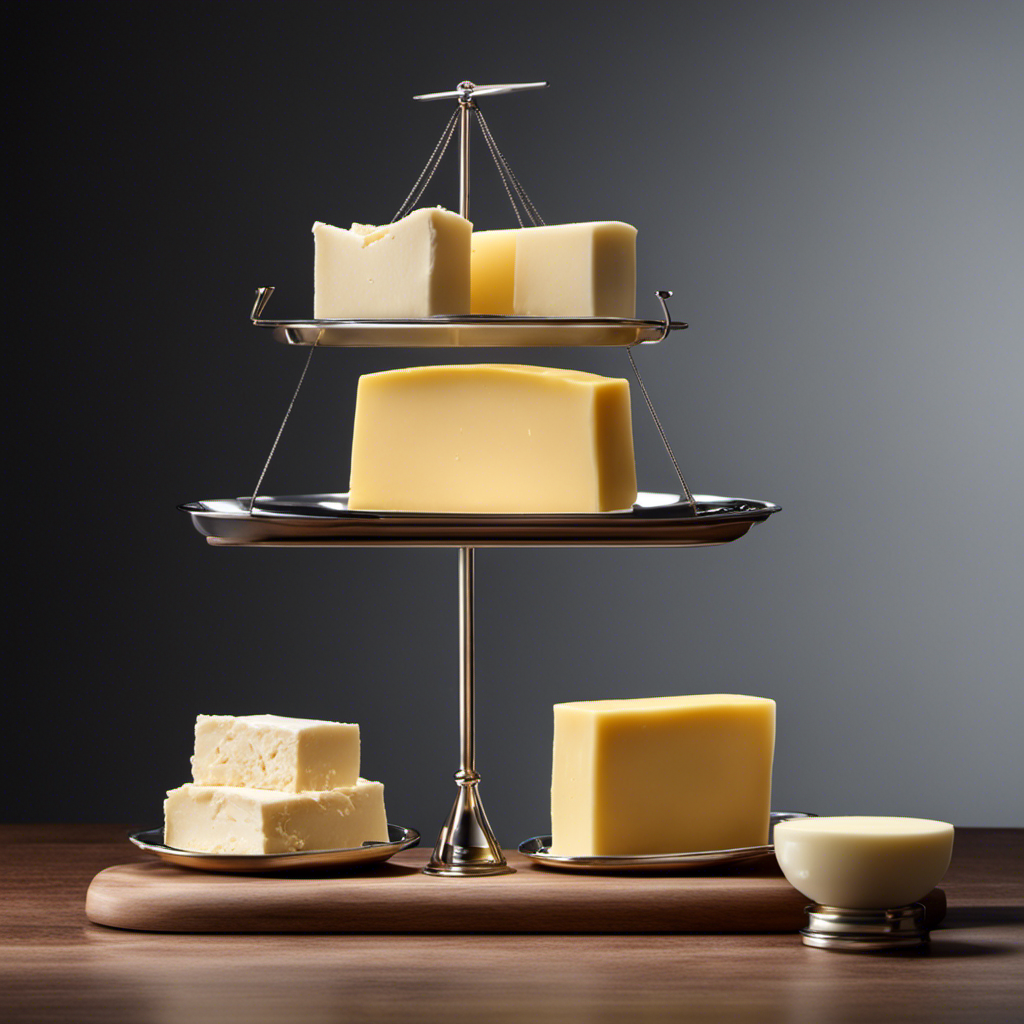
 Recipes & Culinary Uses2 months ago
Recipes & Culinary Uses2 months agoHow Many Sticks of Butter Equals a Pound: A Handy Guide
-

 Shopping Guides1 month ago
Shopping Guides1 month agoWhere to Buy Raw Butter
-

 Recipes & Culinary Uses4 weeks ago
Recipes & Culinary Uses4 weeks agoMake Homemade Butter from Milk at Home
-

 Recipes & Culinary Uses4 weeks ago
Recipes & Culinary Uses4 weeks agoMake Creamy Butter From Buttermilk
-
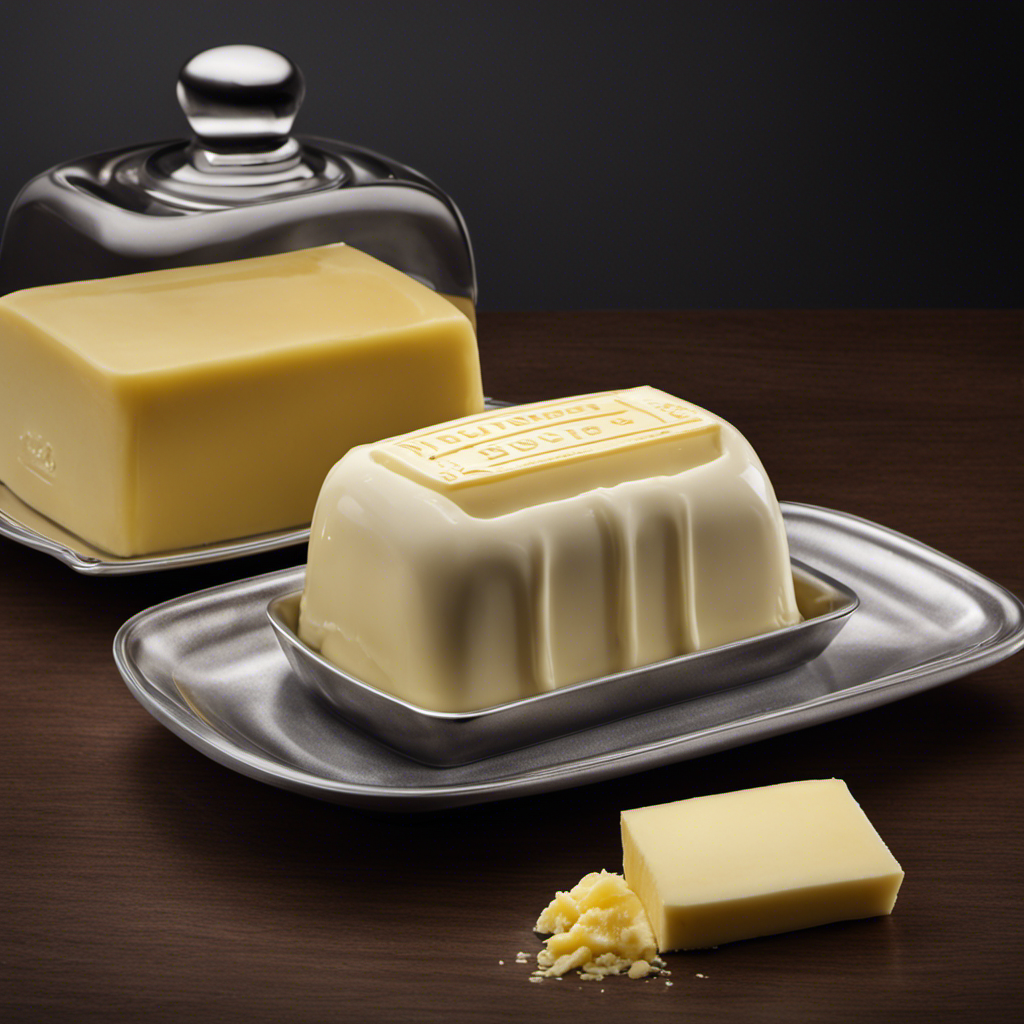
 Butter Tips and Tricks3 months ago
Butter Tips and Tricks3 months agoHow Long Can You Use Butter After the Expiration Date?
-

 Recipes & Culinary Uses2 months ago
Recipes & Culinary Uses2 months agoMake Your Own Homemade Spray Butter
-
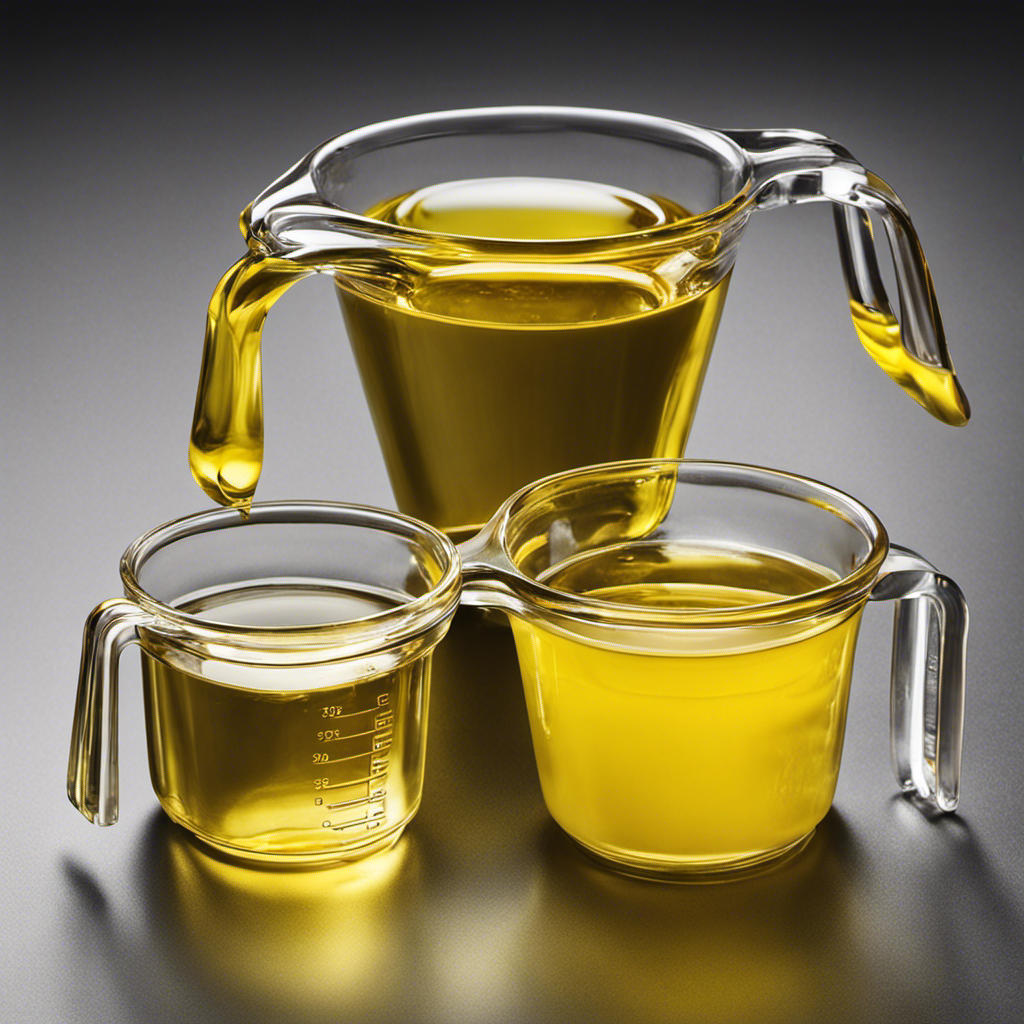
 Butter Tips and Tricks3 months ago
Butter Tips and Tricks3 months agoHow Much Butter to Use Instead of 1/3 Cup Oil
-

 Butter Tips and Tricks3 months ago
Butter Tips and Tricks3 months agoHow Many Calories Are in a Stick of Butter: A Comprehensive Guide
